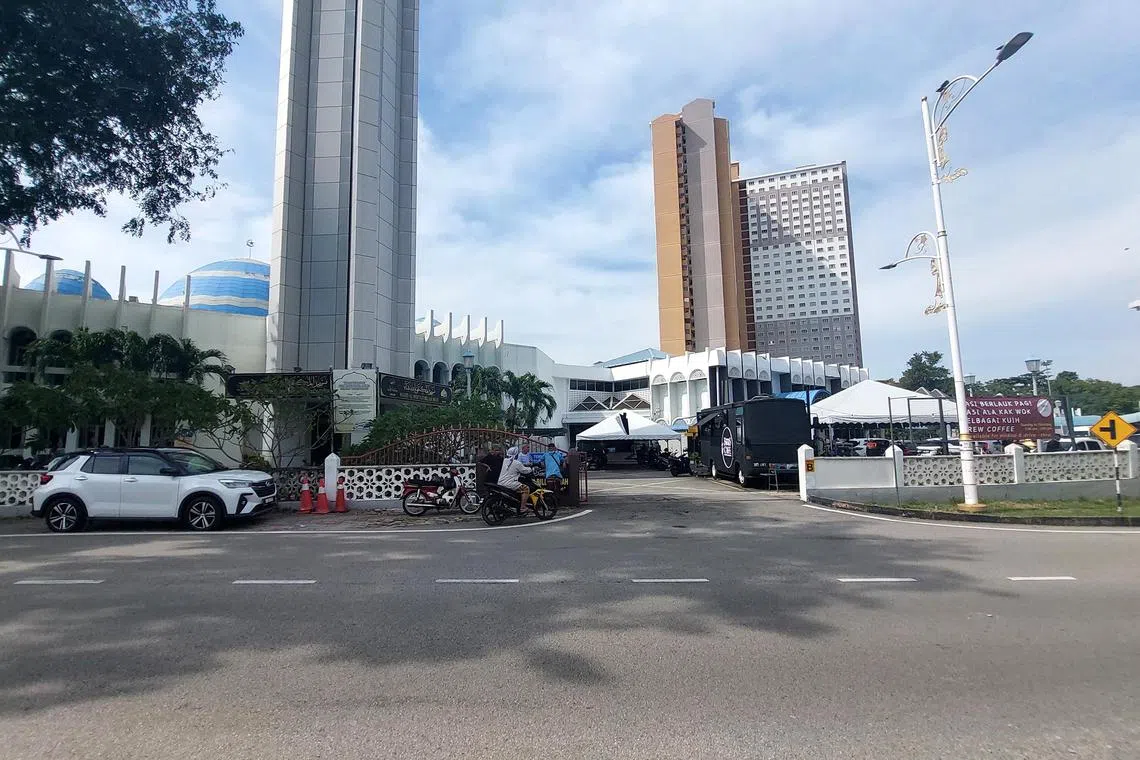Public caning in Terengganu over syariah offence sparks tensions
Sign up now: Get insights on the biggest stories in Malaysia

Carpenter Mohd Affendi Awang being escorted by prison officers to a room at a mosque in Kuala Terengganu to receive six lashes for a syariah offence.
ST PHOTO: AZRIL ANNUAR
Follow topic:
KUALA TERENGGANU – The public caning of a man over an offence under syariah law in Terengganu, a Malaysian state ruled by the country’s main Islamist party, has sparked tensions between conservative Muslims who back such punishments and rights groups that said federal law was broken.
Mohd Affendi Awang, 42, a carpenter, was caned six times at a mosque in the Terengganu capital on Dec 27 for the Islamic crime of close proximity with a non-family member of the opposite sex.
His punishment was witnessed by 70 pre-selected individuals – government officers, members of the media and representatives of non-governmental organisations (NGOs).
It was only the second time that the east coast state had carried out public caning under its syariah law.
In September 2018, two women were publicly caned after they were convicted of attempting to have lesbian sex in a car.
The carpenter’s caning has once again brought into the spotlight Malaysia’s dual-track justice system – comprising the civil court and the syariah court – which has confused non-Muslims navigating inter-religious marriages.
The case also highlighted the power of the country’s 13 state legislatures to enact their own laws, as long as the Federal Constitution is not violated.
Analysts expect the caning to reverberate into mainstream politics as Terengganu is ruled by Parti Islam SeMalaysia (PAS), which has the most number of lawmakers in the federal Parliament.
PAS controls the legislatures of the Malay-Muslim majority states of Terengganu, Kelantan, Kedah and Perlis.
The Terengganu Syariah High Court had on Nov 24 sentenced Affendi to six strokes of the cane after he pleaded guilty to committing khalwat for the third time.
Khalwat occurs when a man and a woman who are not married to one another are found in proximity in a private place.
He had been fined and received four strokes of the cane, in private, for two earlier khalwat offences in 2023 and 2024.
The police deployed 40 officers at the Al-Muktafi Billah Shah Mosque in Kuala Terengganu where the caning took place, and gave instructions that no recording device be used while the punishment was carried out.
Affendi, dressed in an orange jumpsuit, was taken to the mosque from prison in a van, which was escorted by two cars. The convoy arrived at 2.30pm.
A crowd of onlookers surged past the first police barrier after he arrived, but were stopped by the police as they neared a second police line.

Onlookers gathering to witness the public caning of Mohd Affendi Awang.
ST PHOTO: AZRIL ANNUAR
Supporters of public caning argue that such punishments serve as a deterrent and promote public morality, but critics are concerned over the trampling of rights and said that public canings violate federal law.
Malaysian Muslim Lawyers Association deputy president Muhammad Hariz Md Yusoff told a press conference that before and after the lashing, Affendi was inspected by a doctor from the Health Ministry to ensure that he was fit to face the punishment, and also not subsequently injured.
“Affendi wasn’t stripped (of his clothing) when he was caned, and it was done in a humane way. He didn’t cry out in pain when he received the six lashes.
“The prison officer who caned him did not raise the cane above his head when he carried out his duty, and he used only moderate force,” said Mr Hariz, who witnessed the punishment.
Affendi was escorted out of the mosque by prison officers at around 3pm.

The public caning of Affendi took place at the Al-Muktafi Billah Shah Mosque in Kuala Terengganu.
ST PHOTO: AZRIL ANNUAR
Malaysian Bar president Mohamad Ezri Abdul Wahab urged the federal and Terengganu state governments to review the law that allows for public caning, as the punishment undermines the dignity of the individual, he said in a statement.
It could also be considered a violation of Article 5 of the Federal Constitution, which guarantees personal liberty.
“While Act 355 (of the federal law) allows for whipping, it does not envisage the punishment being carried out publicly,” said Mr Ezri.
But the Syariah Judiciary Department said that caning can take place at any location deemed fit by the courts.
Malaysian Muslim Lawyers Association president Muhamad Hisham Marzuki told The Straits Times: “This punishment is seen not as something extreme, but rather as something reasonable, seeing that syariah caning is different, compared to civil caning. It takes into account the needs of the community and the offender.”
G25, an influential NGO comprising senior retired civil servants, said the offender is not a criminal and his behaviour did not pose a threat to life, property or the peace and security of the country.
“State religious departments should maintain the more humane approach of their dakwah (missionary) activities by counselling offenders, guiding, and supporting them to become better Muslims,” G25 said in a statement on Dec 22.
Nine out of Malaysia’s 13 states have carried out caning for syariah offences, usually conducted in jail.
Only Sabah and Terengganu have carried out public lashings. And five states have yet to conduct caning under syariah law: Perlis, Perak, Melaka, Negeri Sembilan and Sarawak.
The Human Rights Commission of Malaysia (Suhakam), an institution established by Malaysia’s Parliament, said there are serious questions on the legality of public caning under the Federal Constitution and federal law.
“The public execution of such a punishment exacerbates its degrading nature, subjecting the individual to humiliation, anguish and shame. Such practice... perpetuates a cycle of stigma, rather than focusing on rehabilitation,” it said.
Human rights lawyer Siti Kasim said she is disappointed with Malaysian politicians, including Prime Minister Anwar Ibrahim, who did not voice his objection to Affendi’s punishment.
“What really gets me is the silence from our politicians, especially our Prime Minister, who didn’t say a word about this. I mean, where are we actually going with regard to this kind of action?”
Analysts say the move to carry out the public lashing reflects increasing Islamic conservatism in Terengganu and the three other states that PAS controls.
The Dec 27 caning “reflects the deep social conservatism in Terengganu and the boldness of the state government in enforcing Islamic laws after its clean sweep of the state legislature”, said risk consultancy KRA Group’s strategic director Amir Fareed Rahim.
He was referring to PAS winning all 32 state-assembly seats in the August 2023 polls.
Dr Mazlan Ali, a political analyst from Universiti Teknologi Malaysia, pointed to the strong influence of PAS clerics in Terengganu and the party’s longstanding mission to implement its vision of Islamic law in Malaysia.
Hazlin Hassan and Azril Annuar are Malaysia correspondents at The Straits Times.

